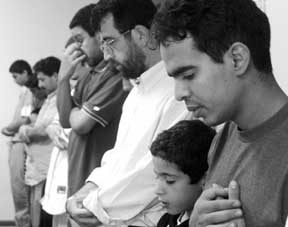Dalia Elemawy, a biological sciences senior, rises each morning around 5:15 a.m.
After washing her hands, mouth, nose, face, arms, head, ears, neck and feet – in that order – she begins the Fajr, a morning obligatory prayer and her first prayer of the day.
Elemawy is Muslim. She follows the obligation observed by Muslims all over the world – prayer five times a day.
Prayer is one of five pillars of Islam – second only to the testimony of faith, “I testify there is no god but Allah. I testify that Muhammad is the messenger of God.”
Each of the five obligatory prayers is prescribed for a certain time of day and includes specific spiritual and physical actions. Though Muslims pray as a community more often during Ramadan, a month of fasting that the Muslim community is now observing, the five prayers are obligatory year-round.
Elemawy prays the Fajr alone in her room. She begins by standing and reading the first chapter of the Quran, which she describes as praise of God. Next she chooses any other chapter in the Quran to read.
Then she leans down and places her hands on her knees.
“I am bowing to God,” she said.
Next she prostrates herself on the floor, her forehead low to the ground.
“This is my testimony to God, ‘You are everything and I am nothing,'” she said.
Then Elemawy leans back on her feet and sits with her legs tucked underneath her. She lays her hands on her knees.
“I am making a testimony of faith and asking God to send blessings upon the prophet Muhammad, peace be upon him, and upon the prophet Abraham, peace be upon him,” she said.
Last Elemawy turns her head, first to the right, then to the left. Muslims believe one angel lives on each of their shoulders. The one on the right writes down all of a person’s good deeds, while the one on the left writes down all of a person’s bad deeds.
“I am asking God to bless these angels,” Elemawy said.
All this is done facing Mecca.
“We face a building in Mecca called Kaaba,” Elemawy said. “It was built by Abraham, peace be upon him. We are not praying to the building itself; it is a point of unity for all Muslims.”
Muslims use this same form of prayer with only slight variation for each of the five prayers of the day. They pray the Fajr at dawn, the Dhuhur around noon, the Aasur in the late afternoon, the Maghrib at sunset and the Isha in the evening.
“The time is sort of flexible,” Elemawy said.
For example, the Dhuhur, the noon prayer, can be prayed anytime between 12 p.m. and 3 p.m. But a Muslim should not postpone the prayer. He or she should pray the prayer as soon as possible, Elemawy said.
Elemawy and many other Muslims are at the University during the day attending classes and studying. Much of this time coincides with the noon and afternoon prayers. Because they are at the University and cannot leave to go to the mosque off campus, they gather in a prayer room especially for them in 121 Prescott hall.
Inside the door, there is an anteroom with a chair, pictures of mosques and a sign in Arabic calligraphy, “In the name of Allah, most gracious, most merciful.”
There are two wooden doors in the anteroom leading to two separate prayer rooms. There is a paper sign on the door the left that reads, “sisters” and another on the door to the right that reads, “brothers.”
Each of the small rooms was once an office for faculty.
The sisters remove their shoes before entering the room, which is large enough to hold four or five people kneeling on the carpeted floor. The desk has been upturned and leaned in a corner of the room. In the opposite corner, a black and white picture of Kaaba in Mecca printed on white computer paper is taped to the wall. The women face this direction during prayer.
Whereas women are allowed to pray in their homes, men are encouraged to pray at the mosque. But the University’s Muslim men are allowed to pray their daily prayers at the University in the prayer room.
Attending the dawn prayer and the evening prayer at a mosque is especially important for men said Muaz Khalil, a kinesiology graduate student and vice president of the Muslim Student Association. Khalil said he rarely sees as many women as men praying at the mosque during those times.
When Khalil and the other brothers meet during the day to pray, there are usually four or five at a time.
“We are encouraged to pray in groups,” he said. “It helps foster unity among us.”
For Khalil and other Muslim students, fitting the prayer into a class schedule can be difficult.
One of the most important times for Muslim men to go to the mosque is Friday at 1:30 p.m. to pray and hear teaching. The time conflict can conflict with necessary classes.
“I have friends who could schedule a class at no other time than that,” Khalil said. “Sometimes they have teachers who are accommodating, but not always.”
For Nadia Haque, a psychology sophomore, planning her schedule around prayer is integral to her faith.
“It forces you to plan your day around God,” she said. “Prayer is so integral to Islam. It’s such a beautiful thing, you know, when you want to talk to God you pray, and when you want to hear from him, you read the Quran. And we do that five times a day.”
Elemawy said the prayer takes discipline.
“You can believe in God, but when you pray five times a day you are obeying him,” she said. “You are disciplining yourself in order to please him.”
Taking Time
November 6, 2003

Taking Time



